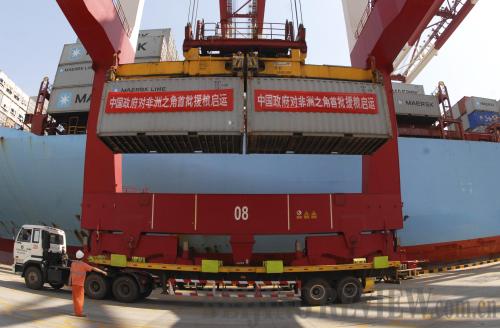|
 |
|
EMERGENCY AID: China's first grain aid to the drought-hit Horn of Africa region are loaded onto a container ship at Tianjin Port on September 2 (HU ZHIQIANG) |
China will encourage its companies to invest overseas and engage in joint ventures with foreign partners. "Chinese companies operating overseas will improve the lives of local people and enhance the ability of host countries to develop themselves," Wang said.
According to the white paper, China's accumulated imports volume is expected to reach $8 trillion in the next five years, which will create more business opportunities for other countries.
The size of China's population and its total economic output mean its domestic market is potentially the largest in the world.
"This creates more business opportunities for other countries," Wang said.
A new concept of security
For the first time, the white paper clearly sets out China's six core national interests, which are; sovereignty, national security, territorial integrity, national reunification, the development of the country's political system and overall social stability.
In the past 20 years, there was no clear definition of China's national interests in political and academic circles, Meng said.
"This document tells our people and the world what China's bottom line is. That is very important. None of these core interests can be compromised," he said.
The white paper points out that, as a key member of the international community, China is optimistic about the prospects for a peaceful future and its thinking on international relations and foreign policy conforms to the principles of peaceful development.
Broadly, this thinking includes promoting the building of a harmonious world, pursuing an independent foreign policy of peace, actively living up to international responsibilities and promoting regional cooperation.
In terms of comprehensive security, the white paper says that China's security dimensions have changed as traditional and non-traditional security threats have become intertwined in the face of new global developments.
"The international community should appreciate the need to ensure security and adopt comprehensive measures to address security threats and their root causes, and countries around the world should work together to meet various challenges to security, " Qu said.
The white paper says that due to globalization all the world's nations have a common stake in the world's security. Therefore it maintains that countries should safeguard their own security while respecting others' security concerns. They should uphold common security through multilateral cooperation and work together to prevent conflicts, it says.
"For China, the world's most populous developing country, running itself well is the best way it can fulfill its international responsibilities," Qu said.
Meanwhile, China has also actively participated in reforming international systems, formulating international rules and addressing global issues. It supports the development of other developing countries, and works to safeguard world peace and stability.
"Promoting regional cooperation and good-neighborly relations, China actively enhances friendly cooperation with its neighbors and works with them to promote a harmonious Asia," says the white paper.
China calls on countries in the region to respect each other, increase mutual trust, and put aside their differences in order to safeguard regional peace, stability, and development.
According to the white paper, "China does not seek regional hegemony or a sphere of influence, nor does it want to exclude any country from participating in regional cooperation."
| 